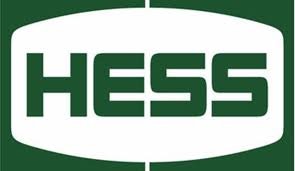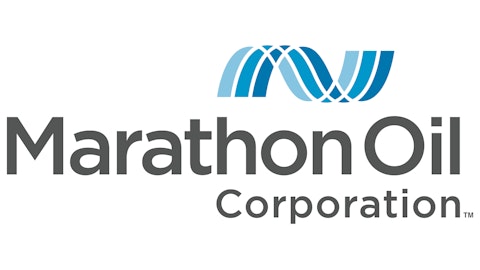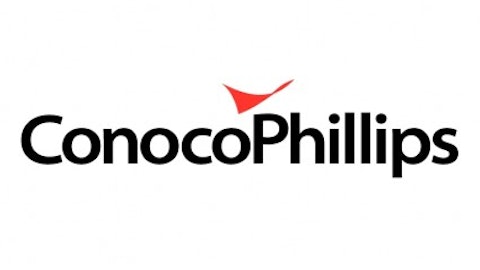Since the beginning of the year, Hess Corp. (NYSE:HES) as experienced a significant rise in the market, up 39.6%, handily beating the S&P 500’s return of only 18.6%. Elliott Management, a 4.5% stake owner in the company, thought that Hess should be worth as much as $126 per share. Michael Price, the famous value investor, also commented that the company could receive an $80 to $90 bid. At the time of writing, Hess is trading at nearly $74 per share. Is Hess a good buy for investors now? Let’s take a closer look and find out.
What does Hess have?

In addition, Hess Corp. (NYSE:HES) is also the owner of Eagle Ford and Utica acreage, and has interests in several “crown jewel” long-life assets in several regions, including Southeast Asia, the Gulf of Mexico and the North Sea.
According to Elliott Management, Hess Corp. (NYSE:HES) should take three steps to unlock the company’s potential hidden asset value, including (1) spinning off Bakken, Eagle Ford and Utica assets, (2) divesting the downstream business and monetizing the midstream assets, and (3) streamlining the international portfolio. Interestingly, Elliott Management estimates that step one would create more than $28 per share for the company; step two would produce an additional $11 per share; and step three would deliver an additional value of $36 per share.
Hess Corp. (NYSE:HES) has been restructuring its business to become a pure exploration and production (E&P) play after it divests the retail business, energy marketing business and energy trading (Hetco) business.
$4 billion potential share repurchases
Since the beginning of the year, the company has divested as much as $3.4 billion worth of assets, on the way to reach a targeted $9.7 billion in asset sales. Then it might use $2.5 billion for debt reduction, $1 billion for cash positions, $1 billion for a deficit fund and as much as $4 billion to repurchase its shares. As Hess Corp. (NYSE:HES) was recently trading at $74 per share, with a total market cap of $25.1 billion, a $4 billion share buyback would represent a high repurchase yield at 15.9% for shareholders.
At the current trading price, Hess Corp. (NYSE:HES) is also valued quite cheaply. The market values Hess at only 4.2 times its trailing EBITDA. Hess offers investors quite a low dividend yield at only 0.6%. However, its payout ratio is extremely low as well, at only 5%.
The cheapest among its peers
Compared to its bigger peers, including ConocoPhillips (NYSE:COP) and Exxon Mobil Corporation (NYSE:XOM), Hess Corp. (NYSE:HES) is the cheapest valued among the three companies. ConocoPhillips was recently trading at $66 per share. It has a total market cap of $80.7 billion. The market values ConocoPhillips at 4.6 times its trailing EBITDA.
ConocoPhillips (NYSE:COP) has also restructured its business, selling its lower margin downstream business to focus on its core E&P activities. It could be considered the biggest independent E&P company in the world, with the total proved reserves of around 8.6 billion.
ConocoPhillips (NYSE:COP) is also one of the big players in the Eagle Ford, Bakken and Permian area, with production growth of as high as 42% in the first quarter 2013. For full-year 2013, the company expects its production from continuing operations to stay be around 1,485 to 1,520 MBOED (millions barrels of oil equivalent a day).
Looking forward, the company expects to realize around $8.5 billion in cash from the divestment of its offshore operations in several countries including Algeria, Nigeria and Kazakhstan. Investors might like ConocoPhillips (NYSE:COP) due to its juicy dividend yield at 4.2%.
Exxon Mobil Corporation (NYSE:XOM) has the highest valuation among the three. It is trading at around $95.20 per share, with the total market cap of $423.2 billion. The market values ExxonMobil at around 6 times its trailing EBITDA. ExxonMobil has much higher proved reserves than the other two companies, at more than 25 billion BOE.
It is also considered the largest natural-gas company in the U.S., with 74 trillion cubic feet equivalent of natural gas in its proved reserves.ConocoPhillips (NYSE:COP) has around 21.7 trillion cubic feet equivalent in its gas proved reserves. Exxon Mobil Corporation (NYSE:XOM) offers investors a much lower dividend yield at only 2.7%. However, its payout ratio is only 23%, much lower than the payout ratio of ConocoPhillips at 43%.
Exxon Mobil Corporation (NYSE:XOM) has been quite excited with the Kearl oil sands project, with around 4.6 billion BOE in its proved reserves. The project could be considered the first oil- sands operation without an up-grader. The president of ExxonMobil development company, Neil Duffin, said that Kearl’s reserves could “meet energy needs for the next 40 years.”
My Foolish take
Personally, I think Hess Corp. (NYSE:HES) could deliver a sweet return to shareholders due to its relatively low valuation, extremely low payout ratio, and the upcoming potential asset divestment activities. With more proceeds from asset sales, Hess could focus on its core business, strengthen its balance sheet and return more cash to its shareholders.
The article More Potential Upside for This E&P Business originally appeared on Fool.com and is written by Anh Hoang.
Anh HOANG has a position in Hess. The Motley Fool has no position in any of the stocks mentioned. Anh is a member of The Motley Fool Blog Network — entries represent the personal opinion of the blogger and are not formally edited.
Copyright © 1995 – 2013 The Motley Fool, LLC. All rights reserved. The Motley Fool has a disclosure policy.





